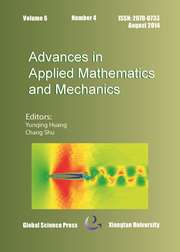Crossref Citations
This article has been cited by the following publications. This list is generated based on data provided by
Crossref.
Gao, Si
Liu, Tiegang
and
Yao, Chengbao
2018.
A complete list of exact solutions for one-dimensional elastic-perfectly plastic solid Riemann problem without vacuum.
Communications in Nonlinear Science and Numerical Simulation,
Vol. 63,
Issue. ,
p.
205.
Liu, Tiegang
Feng, Chengliang
and
Xu, Liang
2019.
Modified Ghost Fluid Method with Acceleration Correction (MGFM/AC).
Journal of Scientific Computing,
Vol. 81,
Issue. 3,
p.
1906.
Liu, Li
Cheng, Jun‐Bo
and
Shen, Yongxing
2021.
An exact Riemann solver for one‐dimensional multimaterial elastic‐plastic flows with Mie‐Grüneisen equation of state without vacuum.
International Journal for Numerical Methods in Fluids,
Vol. 93,
Issue. 4,
p.
1001.
Jia, Xi-yu
Wang, Shu-shan
Feng, Cheng-liang
Zhang, Jing-xiao
and
Ma, Feng
2021.
A practical simulation of a hexanitrohexaazaisowurtzitane (CL-20) sphere detonated underwater with the Taylor wave solution and modified Tait parameters.
Physics of Fluids,
Vol. 33,
Issue. 3,
Zhang, Xiaotao
Liu, Tiegang
Yu, Changsheng
Feng, Chengliang
Zeng, Zhiqiang
and
Wang, Kun
2022.
A Second-order Modified Ghost Fluid Method (2nd-MGFM) with Discontinuous Galerkin Method for 1-D compressible Multi-medium Problem with Cylindrical and Spherical Symmetry.
Journal of Scientific Computing,
Vol. 93,
Issue. 1,
Li, Xiao
Zhai, Jiayin
and
Shen, Zhijun
2022.
The complete exact Riemann solution for one-dimensional elastic–perfectly plastic Riemann problem.
Computer Methods in Applied Mechanics and Engineering,
Vol. 390,
Issue. ,
p.
114346.
Li, Xiao
Zhai, Jiayin
and
Shen, Zhijun
2022.
An HLLC-type approximate Riemann solver for two-dimensional elastic-perfectly plastic model.
Journal of Computational Physics,
Vol. 448,
Issue. ,
p.
110675.
Li, Xiao
Zhai, Jiayin
and
Shen, Zhijun
2022.
Elastic Hugoniot curve of one-dimensional Wilkins model with general Grüneisen-type equation of state.
Journal of Computational Physics,
Vol. 464,
Issue. ,
p.
111337.
Zhao, Fuyu
Wang, Cheng
Jia, Xiyu
and
Wang, Wanli
2023.
Harten-Lax-van Leer-discontinuities with elastic waves (HLLD-e) approximate Riemann solver for two-dimensional elastic-plastic flows with slip/no-slip interface boundary conditions.
Computers & Fluids,
Vol. 265,
Issue. ,
p.
106015.
Niu, Panyu
Qing, Fang
Wang, Cheng
Jia, Zupeng
and
Wang, Wanli
2024.
An efficient second-order cell-centered Lagrangian discontinuous Galerkin method for two-dimensional elastic-plastic flows.
Physics of Fluids,
Vol. 36,
Issue. 3,
Zeng, Zhiqiang
Wang, Hao
Liu, Tiegang
and
Yu, Changsheng
2026.
Path-conservative finite volume scheme with Hooke’s law-preserving paths for non-conservative hyperbolic system of hypo-elastic plastic solid.
Journal of Computational Physics,
Vol. 546,
Issue. ,
p.
114511.

